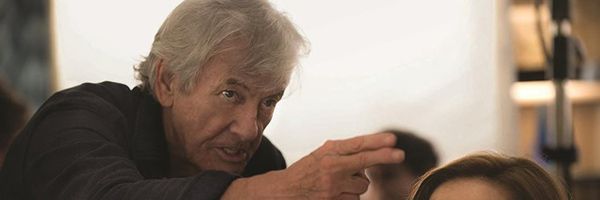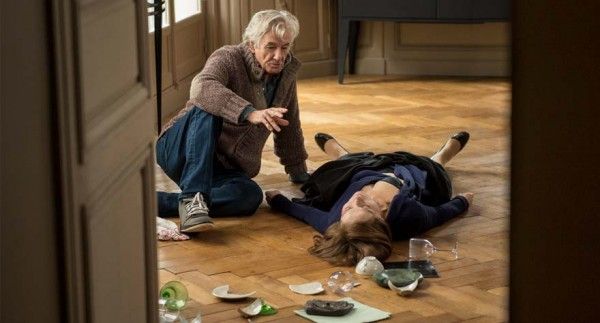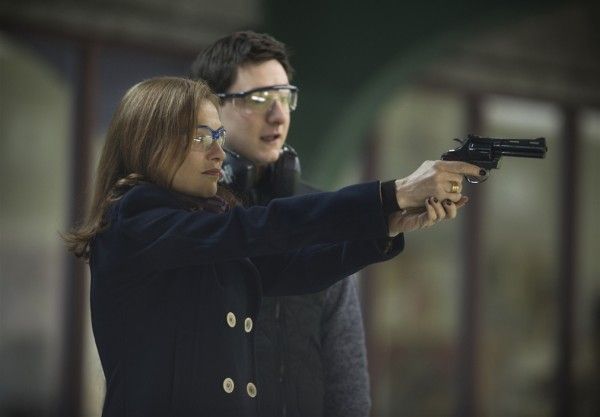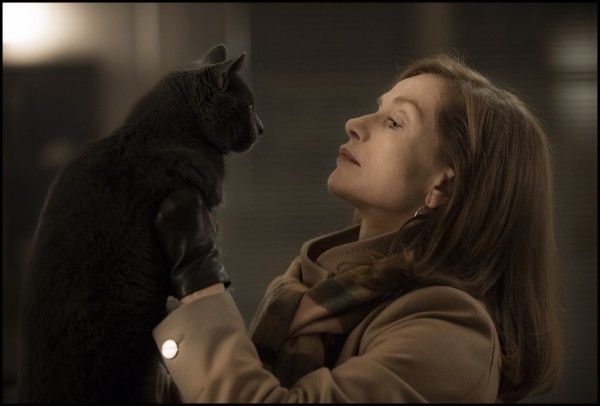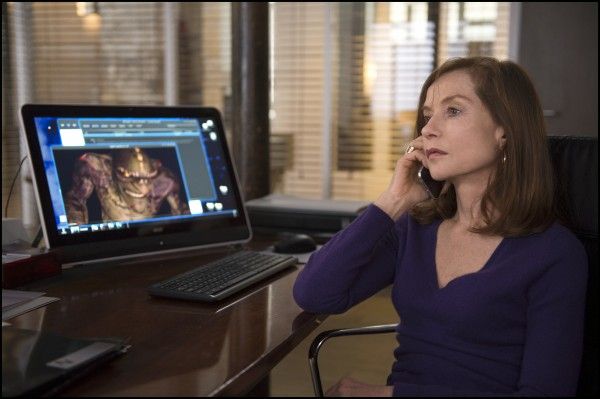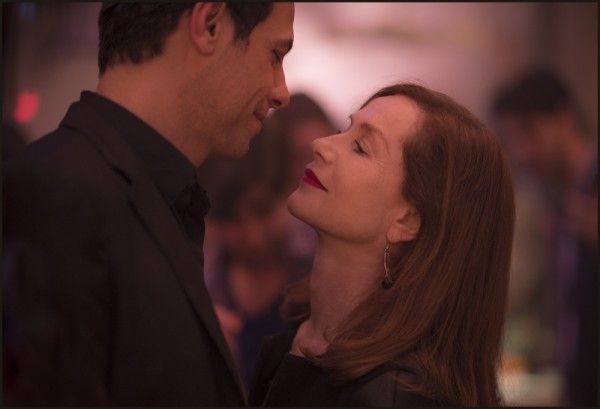For those who like their entertainment secretly satirical and passionately perverse, Paul Verhoeven is the creepy uncle that we all wish we had. The Dutch filmmaker made a name for himself on the art house circuit in the 70s and 80s by gleefully pushing the boundaries of good taste in titles like Turkish Delight and The Fourth Man. Though he always had a gift for visuals and sweet tooth for thrillers, the man seemed unlikely to ever make a Hollywood transition given his desire to fill the screen with excessive sex n’ violence in the name of entertainment as well as flavour it all with politicized subtext that made all his sensationalism worth pondering. Yet somehow he did move to la-la-land and found success.
Through titles like Robocop, Total Recall, Basic Instinct, and Starship Troopers, Verhoeven became both a box office champion and a master of secret subversion. His films delivered rollicking R-rate spectacle to draw in the masses, yet there was always a sneaky wit underneath them that parodied and politicized the type of sleazy entertainment that Hollywood filmmakers rarely ever intellectualized. He found an odd balance between giving studios and viewers what they want, while also giggling his way through the process by slyly criticizing American fascination with those cheap thrills. Of course, the party ended after a few box office failures (most notoriously Showgirls) and when he lost the ability to have complete control over his blockbuster provocations, Verhoeven went back to Europe.
Since then the filmmaker’s output has been less common, but far more uncompromising in vision. His latest feature Elle is a twisted dark comedy about rape and sexual politics that practically dares viewers to scream in outrage. Yet thanks to the perfect casting of the stunningly talented Isabelle Huppert in the complicated lead role and Verhoeven’s patented mix of wit and style, the film works. Constantly teetering on the edge of utter offensiveness, yet always intelligently controlled and executed, the filmmaker’s latest provocation proves to be a thoroughly satisfying conversation piece, character study, and dirty little thriller.
Collider got a chance to chat up the 78-year-old director shortly after the film’s North American premiere at this year’s Toronto International Film Festival, touching on everything from his consistent courting of controversy to why he’s as irritated by the ill-conceived sequels and remakes of his Hollywood movies as you.
Collider: After Elle premiered at Cannes people have been saying that your movie would be controversial and divisive and yet it’s been difficult to find many people who actually disliked it. Has that been surprising?
PAUL VERHOEVEN: I was warned for months even before Cannes that the movie will be very controversial, but I’m still waiting for the controversy. It’s weird. Even here, of course there have been some critics who hate the movie, but there has been no controversy yet. It might come when it gets into the streets, but I’m starting to doubt if it’s controversial.
Do you like generating controversy and pissing people off with your movies? Sometimes I get the impression that amuses you.
VERHOEVEN: No. It’s actually very annoying and destructive in fact. But I would never change a script because of the possibility of controversy. If I like it, I say, “fuck it.” I trust my intuition as long as I can handle it. Of course, that’s a big assumption that everyone else can handle it too. But no, I think you have to accept that some things will be controversial and never censor yourself.
When did you find Philippe Djian’s book at what drew you to it as a potential movie?
VERHOEVEN: It was a year and a half ago the French producer Said Ben Said sent me a French book and said, “if you can read it would you like to do it?” So that was it. It was just offered to me. He didn’t know me. I’d only known that he’d done some movies with Polanski and Cronenberg. But he felt that it would make a good American movie and it was something that we could do together since my career is half American.
That must have been the first time something was offered to you in a while.
VERHOEVEN: Yes, there was a big gap. Starship Troopers was the last time.
How did people react when you took the project around in America?
VERHOEVEN: Oh, badly. Yeah. There very little enthusiasm, I would say, from financers. But what was far more dominant in our decision to give up on making it America was that the five or six A-level actresses that we approached gave us a straight “no” from the very beginning. Not even to the degree that you sometimes have where they aren’t entirely convinced and want to discuss your intentions or what you’ll show. None of that. It was just “No, no, no, no.” That went on for six weeks and then Said called me and said, “I think we are really on the wrong road. We have to go back to France.”
How did you land on Isabelle Huppert. Was she your first choice when you began looking for European actresses?
VERHOEVEN: I would say that I was actually her choice. She wanted to do the movie long before I was even there. She had already approached Said and Philippe Dijian saying that she had read the book and wanted to do it immediately. But we thought we knew better and went in the American direction and then somewhat humiliated we went back to Isabelle and said, “Oh…by the way…we’re back in France. How about doing it?” (Laughs). Straight away she said, “Of course.”
She’s incredible in it.
VERHOEVEN: Yeah, she protects the movie.
When she got involved, aside from the French translation, did you change or adjust the movie to suit her specifically?
VERHOEVEN: No, I gave her the script and we discussed a little retranslation. But it wasn’t anything to do with the story, only the text. We made sure that the translation because really French, but we never talked about character. We talked about nudity a bit and I showed her the storyboards and all that stuff. But we never talked about psychological developments or why she would do this or why she would do that. We didn’t discuss that once. It was clear. It was like, this is the script, I like it, I’ll do it. So in the morning I would go to the make up room and talk a little bit about the staging. Then she would come to the set and she’d do it with almost no discussion at all. We didn’t need to. It was amazing. You would expect long discussions about specific elements of her character and there were none.
She always gave you exactly what you were looking for?
VERHOEVEN: Not only that, but after a few days I noticed that any time she made changes or did something different, I always thought, “Oh yeah, that’s better.” She was so in character that I trusted her much more than myself. That’s how we shot it.
Was your intention to always open the movie in the rather shocking manner that you did? It really puts viewers off balance immediately.
VERHOEVEN: No. That happened in the editing. Well, of course it was always supposed to start with the eyes of the cat. There was a cat in the book and I took it from there. Then while we were editing I suddenly had the feeling that there should be sounds before. I thought it would be interesting to have the first sound of the crash under my name (Laughs) and then the sounds of sex or rape, you don’t know what it is. Then later I knew that we would explore it with more detail in flashback. Some of these things happen in post-production. You never know.
I gather that you shot this with two cameras at all times like your last project Tricked.
VERHOEVEN: Yes, that’s right.
Since you’re someone with such a distinct visual style, I wonder how you’re finding that? Is it limiting or do you enjoy the experimental aspect of it?
VERHOEVEN: I love it, actually. I’m a big fan. I did that in Tricked, but I learned it from the DP. He brought his friend and they did it together. I thought it would be fun to try and then as we were doing it I started to realized the possibilities. So then when I came to France for Elle and we hired Stephane Fontaine who did A Prophet and very good stuff, proposed that to him. I told him to find someone who should be a DP that he trusted to share the camera with him. There would be no A camera or B camera. Both were just as important. So they started to do that, especially in the dinner scene that worked very well. Sometimes we would have the two cameras nearly next to each other with two different lenses and in other scenes they would be dialectic and oppose each other. It’s very useful, but you really need two cameramen who like each other, otherwise it will turn into an ego thing. So Stephane found an old assistant who was now a cinematographer and he loved the idea so it was great. It was very difficult for the focus puller because it was all handheld on the shoulder because I like the little feeling of observation and nonchalance that it gives. I think I’ll do it again because it forces you not to be so precise and embrace a little chaos.
I really enjoy the humor in all of your movies, but I find that the performances you get are never overtly comedic. Everyone plays things very straight. So I wonder, do you even discuss the comedy with your actors or do you try to discourage them to even think about that aspect?
VERHOEVEN: Very little. The comedy is not so much from the performances, it’s more from the situations. With this movie, Charles Burning, who plays Isabelle’s ex-husband, has done a lot of comedy. So when he first came to set he was playing a scene in comedy style and the only conversation that we ever had about the comedy was me telling him, “No Charles, the situation is funny. Don’t accentuate it in any way.” He said, “Ok.” And then he never did it again. I love that. It’s not always so easy.
At this point aside from Showgirls all of your Hollywood movies have sequels or remakes or both. I always wondered if you watch them and what you think about them?
VERHOEVEN: Oh sure, I watch them. Somehow they seem to think that the lightness of say Total Recall and Robocop is a hindrance. So they take these somewhat absurd stories and make them much too serious. I think that is a mistake. Especially in Robocop when he awakens they gave him the same brain. He’s a horribly injured and amputated victim, which is horrifying and tragic from the very beginning. So we didn’t do that in Robocop. His brain is gone and he has only flashes of memory and needs to go to a computer to find out who he even is. I think by not having a robot brain, you make the movie much heavier and I don’t think that helps the movie in anyway. It becomes more silly or absurd, but in the wrong way. Both those movies needed the distance of satire or comedy to situate it for audiences. Playing it straight without any humour is a problem and not an improvement.
Well, that’s why I miss you making those sorts of movies. No one else even tries to do that sort of thing.
VERHOEVEN: It’s interesting, I just heard that they want to…when I did Robocop they immediately wanted to do a sequel the next year. This was Orion who went bankrupt, but that’s ok. So I was interested. In the United States they make sequels. I get it. So myself and Michael Miner started working on ideas. We were really thinking about it because I feel a sequel has to go further. I think one of the best sequels is Star Wars 2, probably. That is a sequel that's good. Normally they aren’t good because it’s so difficult to find that inspiration. So I really wanted to take some time and develop something that deserved to exist and was different. But Orion didn’t want to wait, so they used other people. But I just heard that MGM was thinking of picking up the ideas that we were working on in '87 (Laughs). I don’t know if they’ll do it, but they are talking about it.

